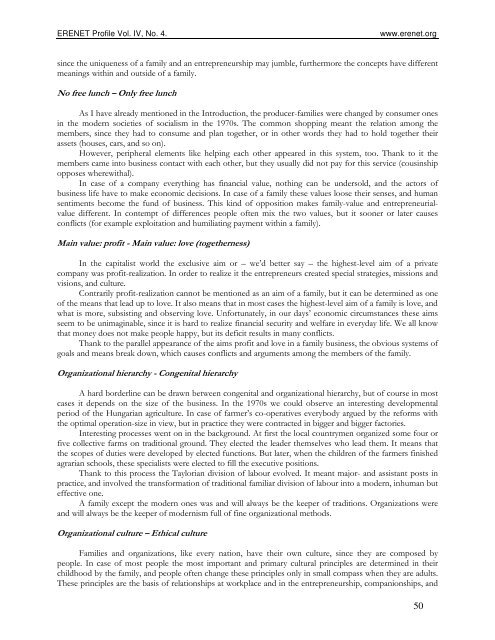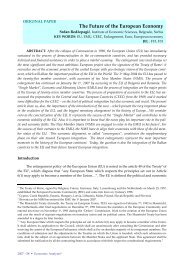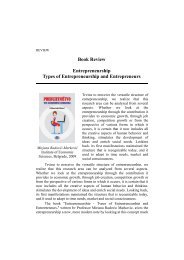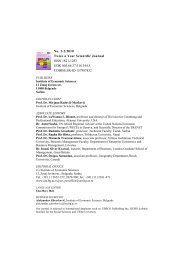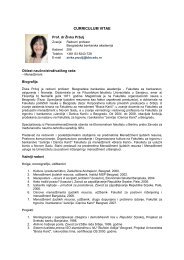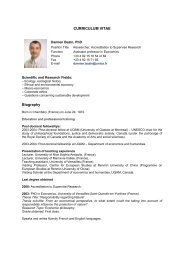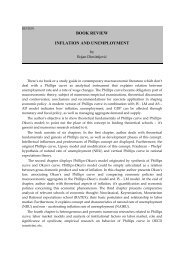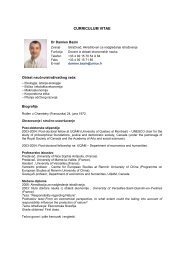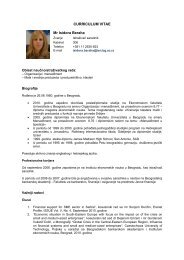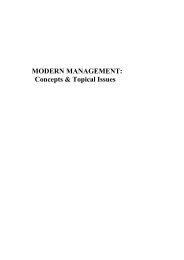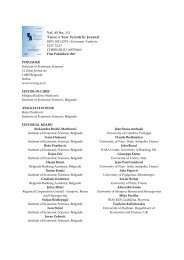Issue 16
Issue 16
Issue 16
You also want an ePaper? Increase the reach of your titles
YUMPU automatically turns print PDFs into web optimized ePapers that Google loves.
ERENET Profile Vol. IV, No. 4.<br />
www.erenet.org<br />
since the uniqueness of a family and an entrepreneurship may jumble, furthermore the concepts have different<br />
meanings within and outside of a family.<br />
No free lunch – Only free lunch<br />
As I have already mentioned in the Introduction, the producer-families were changed by consumer ones<br />
in the modern societies of socialism in the 1970s. The common shopping meant the relation among the<br />
members, since they had to consume and plan together, or in other words they had to hold together their<br />
assets (houses, cars, and so on).<br />
However, peripheral elements like helping each other appeared in this system, too. Thank to it the<br />
members came into business contact with each other, but they usually did not pay for this service (cousinship<br />
opposes wherewithal).<br />
In case of a company everything has financial value, nothing can be undersold, and the actors of<br />
business life have to make economic decisions. In case of a family these values loose their senses, and human<br />
sentiments become the fund of business. This kind of opposition makes family-value and entrepreneurialvalue<br />
different. In contempt of differences people often mix the two values, but it sooner or later causes<br />
conflicts (for example exploitation and humiliating payment within a family).<br />
Main value: profit - Main value: love (togetherness)<br />
In the capitalist world the exclusive aim or – we’d better say – the highest-level aim of a private<br />
company was profit-realization. In order to realize it the entrepreneurs created special strategies, missions and<br />
visions, and culture.<br />
Contrarily profit-realization cannot be mentioned as an aim of a family, but it can be determined as one<br />
of the means that lead up to love. It also means that in most cases the highest-level aim of a family is love, and<br />
what is more, subsisting and observing love. Unfortunately, in our days’ economic circumstances these aims<br />
seem to be unimaginable, since it is hard to realize financial security and welfare in everyday life. We all know<br />
that money does not make people happy, but its deficit results in many conflicts.<br />
Thank to the parallel appearance of the aims profit and love in a family business, the obvious systems of<br />
goals and means break down, which causes conflicts and arguments among the members of the family.<br />
Organizational hierarchy - Congenital hierarchy<br />
A hard borderline can be drawn between congenital and organizational hierarchy, but of course in most<br />
cases it depends on the size of the business. In the 1970s we could observe an interesting developmental<br />
period of the Hungarian agriculture. In case of farmer’s co-operatives everybody argued by the reforms with<br />
the optimal operation-size in view, but in practice they were contracted in bigger and bigger factories.<br />
Interesting processes went on in the background. At first the local countrymen organized some four or<br />
five collective farms on traditional ground. They elected the leader themselves who lead them. It means that<br />
the scopes of duties were developed by elected functions. But later, when the children of the farmers finished<br />
agrarian schools, these specialists were elected to fill the executive positions.<br />
Thank to this process the Taylorian division of labour evolved. It meant major- and assistant posts in<br />
practice, and involved the transformation of traditional familiar division of labour into a modern, inhuman but<br />
effective one.<br />
A family except the modern ones was and will always be the keeper of traditions. Organizations were<br />
and will always be the keeper of modernism full of fine organizational methods.<br />
Organizational culture – Ethical culture<br />
Families and organizations, like every nation, have their own culture, since they are composed by<br />
people. In case of most people the most important and primary cultural principles are determined in their<br />
childhood by the family, and people often change these principles only in small compass when they are adults.<br />
These principles are the basis of relationships at workplace and in the entrepreneurship, companionships, and<br />
50


